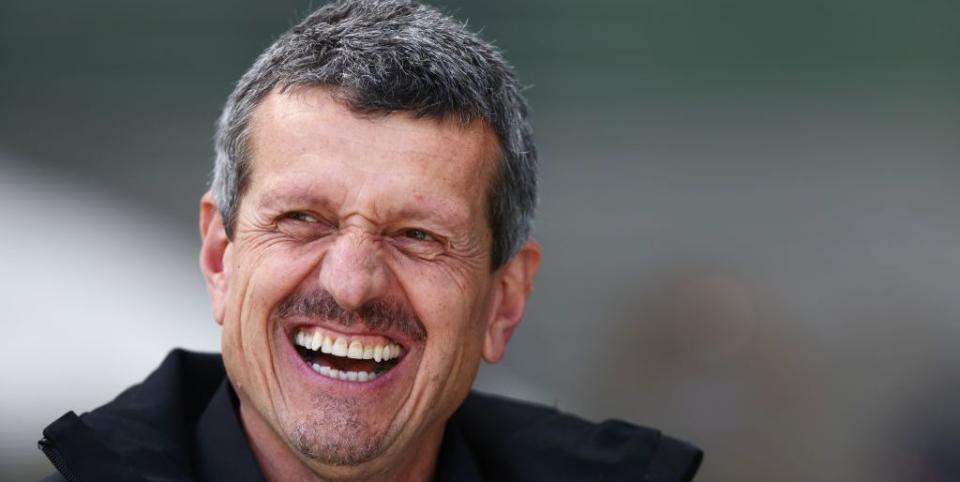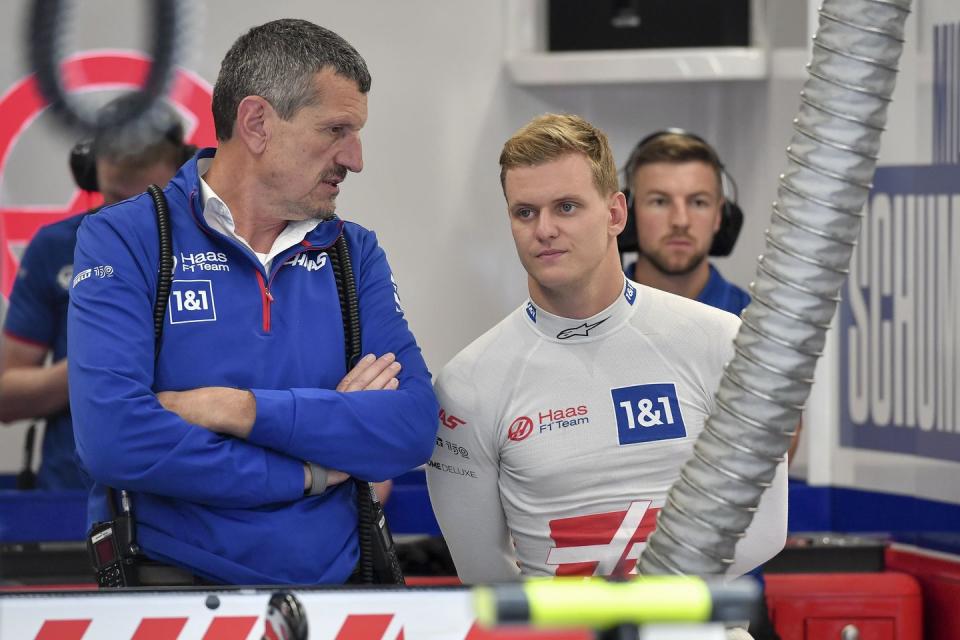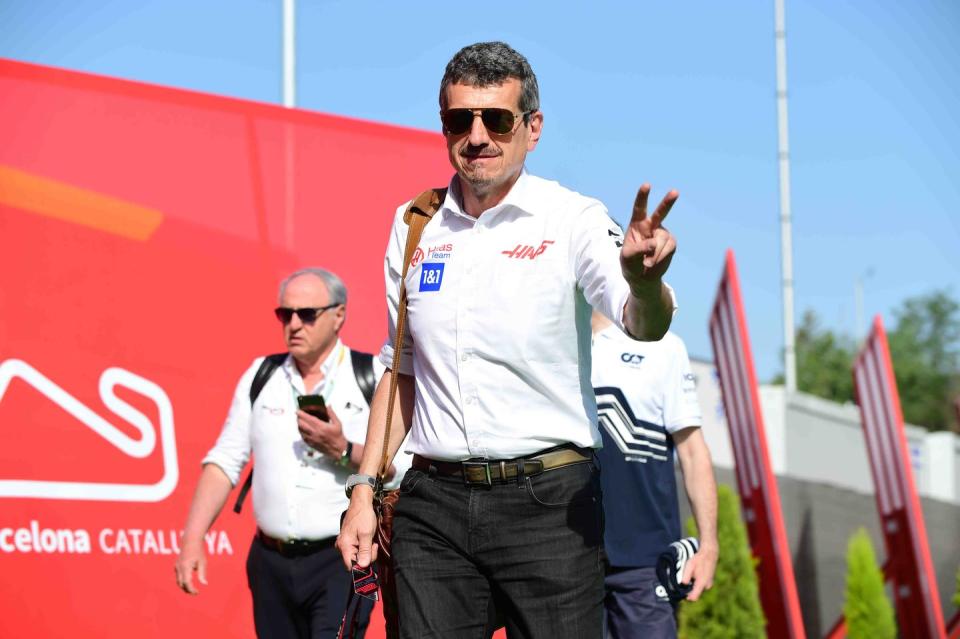Book Review: Much-Anticipated Guenther Steiner Book Lifts Lid on Haas F1 Team

"Hearst Magazines and Yahoo may earn commission or revenue on some items through these links."
Haas F1 team principal Guenther Steiner’s popularity skyrocketed after Formula 1’s Drive to Survive docuseries on Netflix, which Steiner says he has still never watched.
Steiner's no-nonsense approach, distinctive demeanor, and penchant for a profanity have earned him a legion of fans.
A theme through the book is the frustration with Mick Schumacher, with whom there appears a disconnect throughout.
Surviving to Drive—a not-so-subtle linguistic twist on Drive to Survive—is the most anticipated Formula 1 book in some time.
Penned by Guenther Steiner, it charts the 2022 season of the Haas Formula 1 Team of which Steiner sits at the helm.
Steiner’s popularity skyrocketed after Formula 1’s Drive to Survive docuseries on Netflix, which Steiner says he has still never watched. His no-nonsense approach, distinctive demeanor, and penchant for a profanity earned him a legion of fans.
And the publishers lucked into a 2022 campaign that had “more drama in it than a thousand episodes of a foking Mexican soap opera” for Haas, as Steiner pens it.

Surviving to Drive
$26.72
amazon.com
It is easy, in April 2023, to forget how much happened to Haas, especially early in 2022. Steiner explains the team’s difficult COVID-influenced demise across 2020-21 and planned recovery, its technical restructuring, there is then the saga and fallout surrounding Nikita Mazepin and Uralkali, reliability setbacks and even costly out-of-its-hands freight delays—before Race 1 of 22 has even taken place.
If something bad is happening, a mechanic quips to Steiner, it is surely happening to Haas.
The rest of the season is a rollercoaster, from the highs of P5 in Bahrain and shock pole in São Paulo, to the lows of point-less runs and Mick Schumacher’s crashes, estimated to cost Haas $2 million. A running theme of the book post-Uralkali is Haas’ pursuit of a new title sponsor, which eventually comes in the form of MoneyGram, securing Haas a near nine-figure sum for 2023 and beyond. A rival team tries to snatch away the deal, who Steiner claims offers MoneyGram a one-third discount, indicating the politics at play in the paddock.
It is clear throughout that every thought and decision for Steiner is about what is best for Haas and its workforce.
Steiner emerges as not just Haas’ team principal but its public face, a motivator to its personnel, and effectively one of its co-founders given how he lobbied Gene Haas in the early 2010s to enter Formula 1. Their early encounters are relayed, including how Steiner was awoken at 2 a.m. to give a 90-minute presentation to then F1 boss Bernie Ecclestone about why Haas should be allowed into the sport. Steiner lives all of Haas’ highs and lows, and is desperate to see the team succeed. “It’s the last thing I think about before going to sleep and the first when I wake: (His wife) Gertie, (daughter) Greta, and two hundred employees scattered over the world,” he writes.
It is also clear that Steiner revels in Haas’ role as an underdog—something of a disruptor—and doing so in a quirky and non-corporate manner. It is hard to envisage Steiner slotting in at any other squad (despite having worked at other F1 teams in the past!) while it is equally difficult to imagine Haas with any other figure than Steiner at the helm. He is regularly self-deprecating, describing himself as “an Italian wanker with a big nose, a weird accent and a German name” and accepts that his main skill is his ability to talk.

A theme through the book is the frustration with Mick Schumacher, with whom there appears a disconnect throughout. Steiner wills Schumacher to step up but doubts seep in as early as the fourth round at Imola, in April, with those worries exploding after Schumacher’s violent accident in Monaco.
“Mick seems unable to appreciate the gravity of the situation, at least publicly, which is also worrying,” Steiner writes after pondering Schumacher’s second car major crash, forcing him to think “something’s not right here.” The youngster’s in-lap crash at a wet Suzuka practice appears the end of his chances as Steiner writes “I cannot have a driver who I am not confident can take a car around safely on a slow lap.”
Schumacher’s contract was not extended for 2023 and he was replaced by Nico Hulkenberg.
Kevin Magnussen takes flak at stages too, especially during a run of avoidable incidents, at which the “dedication and right attitude” of both drivers is pondered. Is it what separates the good drivers from the very top drivers, wonders Steiner, referencing the relentless Fernando Alonso. Steiner also suggests Magnussen has become slightly complacent at stages and reckons the recruitment of Hulkenberg will make him up his game. There is nevertheless a clear fondness for “the miniature Viking” given their lengthy history.
There is understandable praise and warmth for Gene Haas’ vision, commitment and calmness—chalk and cheese to the ever-animated Steiner—and Ferrari for its willingness to partner with Haas when it was striving to join Formula 1.

Conversely there are various personnel or parties that receive Steiner’s ire throughout the year, including then McLaren boss Andreas Seidl, the FIA’s stewards—“if we were as consistently good as they are poor we’d be a top-three team” —fawning driver managers, and arrogant celebrities. Special disdain, though, is reserved for Mick Schumacher’s uncle, Ralf, on account of regular criticism of Steiner. Maybe Ralf “could help his nephew and bring something to the table, instead of just trying to stir shit all the time,” Steiner writes in Austin.
After announcing Mick’s departure, Steiner reveals his admiration at how Mick has handled the pressure of a surname before quipping “his entourage and supporters, perhaps not so much.”
Steiner intersperses some of the more humdrum days at grands prix with tales from his rallying years—his experience of a Dakar Rally disaster is extraordinary—his bafflement at the fame that his Haas role and DTS popularity has brought, as well as how he balances family life with 10 months of the year on the road. Steiner could probably write another book alone with just stories from his disastrous time at Jaguar alongside the late Niki Lauda, who emerges as one of Steiner’s biggest inspirations.
Written in Steiner’s voice the stylized ‘fok’ and ‘jeezos’ can become a little grating through the course of the year, but conversely it does add to the individualistic aura of the book and remind you this is Steiner and no one else.
‘Surviving to Drive, A Year Inside Formula 1, by Guenther Steiner’, published by Bantam Press, is available from April 20

 Yahoo Autos
Yahoo Autos 